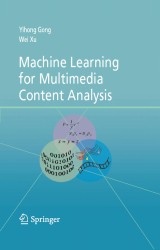Details

Machine Learning for Multimedia Content Analysis
Multimedia Systems and Applications, Band 30
|
96,29 € |
|
| Verlag: | Springer |
| Format: | |
| Veröffentl.: | 26.09.2007 |
| ISBN/EAN: | 9780387699424 |
| Sprache: | englisch |
| Anzahl Seiten: | 277 |
Dieses eBook enthält ein Wasserzeichen.
Beschreibungen
<P>Challenges in complexity and variability of multimedia data have led to revolutions in machine learning techniques. Multimedia data, such as digital images, audio streams and motion video programs, exhibit richer structures than simple, isolated data items. A number of pixels in a digital image collectively conveys certain visual content to viewers. A TV video program consists of both audio and image streams that unfold the underlying story. To recognize the visual content of a digital image, or to understand the underlying story of a video program, we may need to label sets of pixels or groups of image and audio frames jointly.</P>
<P><STRONG>Machine Learning for Multimedia Content Analysis</STRONG> introduces machine learning techniques that are particularly powerful and effective for modeling spatial, temporal structures of multimedia data and for accomplishing common tasks of multimedia content analysis. This book systematically covers these techniques in an intuitive fashion and demonstrates their applications through case studies. This volume uses a large number of figures to illustrate and visualize complex concepts, and provides insights into the characteristics of many algorithms through examinations of their loss functions and straightforward comparisons.</P>
<P><STRONG>Machine Learning for Multimedia Content Analysis</STRONG> is designed for an academic and professional audience. Researchers will find this book an invaluable tool for applying machine learning techniques to multimedia content analysis. This volume is also suitable for practitioners in industry.</P>
<P> </P>
<P><STRONG>Machine Learning for Multimedia Content Analysis</STRONG> introduces machine learning techniques that are particularly powerful and effective for modeling spatial, temporal structures of multimedia data and for accomplishing common tasks of multimedia content analysis. This book systematically covers these techniques in an intuitive fashion and demonstrates their applications through case studies. This volume uses a large number of figures to illustrate and visualize complex concepts, and provides insights into the characteristics of many algorithms through examinations of their loss functions and straightforward comparisons.</P>
<P><STRONG>Machine Learning for Multimedia Content Analysis</STRONG> is designed for an academic and professional audience. Researchers will find this book an invaluable tool for applying machine learning techniques to multimedia content analysis. This volume is also suitable for practitioners in industry.</P>
<P> </P>
Unsupervised Learning.- Dimension Reduction.- Data Clustering Techniques.- Generative Graphical Models.- of Graphical Models.- Markov Chains and Monte Carlo Simulation.- Markov Random Fields and Gibbs Sampling.- Hidden Markov Models.- Inference and Learning for General Graphical Models.- Discriminative Graphical Models.- Maximum Entropy Model and Conditional Random Field.- Max-Margin Classifications.
<P>Challenges in complexity and variability of multimedia data have led to revolutions in machine learning techniques. Multimedia data, such as digital images, audio streams and motion video programs, exhibit richer structures than simple, isolated data items. A number of pixels in a digital image collectively conveys certain visual content to viewers. A TV video program consists of both audio and image streams that unfold the underlying story. To recognize the visual content of a digital image, or to understand the underlying story of a video program, we may need to label sets of pixels or groups of image and audio frames jointly.</P>
<P><STRONG>Machine Learning for Multimedia Content Analysis</STRONG> introduces machine learning techniques that are particularly powerful and effective for modeling spatial, temporal structures of multimedia data and for accomplishing common tasks of multimedia content analysis. This book systematically covers these techniques in an intuitive fashion and demonstrates their applications through case studies. This volume uses a large number of figures to illustrate and visualize complex concepts, and provides insights into the characteristics of many algorithms through examinations of their loss functions and straightforward comparisons. </P>
<P><STRONG>Machine Learning for Multimedia Content Analysis</STRONG> is designed for an academic and professional audience. Researchers will find this book an invaluable tool for applying machine learning techniques to multimedia content analysis. This volume is also suitable for practitioners in industry.</P>
<P> </P>
<P><STRONG>Machine Learning for Multimedia Content Analysis</STRONG> introduces machine learning techniques that are particularly powerful and effective for modeling spatial, temporal structures of multimedia data and for accomplishing common tasks of multimedia content analysis. This book systematically covers these techniques in an intuitive fashion and demonstrates their applications through case studies. This volume uses a large number of figures to illustrate and visualize complex concepts, and provides insights into the characteristics of many algorithms through examinations of their loss functions and straightforward comparisons. </P>
<P><STRONG>Machine Learning for Multimedia Content Analysis</STRONG> is designed for an academic and professional audience. Researchers will find this book an invaluable tool for applying machine learning techniques to multimedia content analysis. This volume is also suitable for practitioners in industry.</P>
<P> </P>
First book dedicated to the multimedia community to address unique problems and interesting applications of machine learning in this area Includes examples of unsupervised learning, generative models and discriminative models Includes Maximum Margin Markov (M3) networks, which strives to combine the advantages of both the graphical models and Support Vector Machines (SVM) Includes supplementary material: sn.pub/extras
<P>Multimedia data, such as digital images, audio streams and motion video programs, exhibit richer structures than simple, isolated data items. This volume introduces machine learning techniques that are particularly powerful and effective for modeling multimedia data and common tasks of multimedia content analysis. It systematically covers key machine learning techniques in an intuitive fashion and demonstrates their applications through case studies. Coverage includes examples of unsupervised learning, generative models and discriminative models. In addition, the book examines Maximum Margin Markov (M3) networks, which strive to combine the advantages of both the graphical models and Support Vector Machines (SVM).</P>
Diese Produkte könnten Sie auch interessieren:

Mixed-Signal Layout Generation Concepts

von: Chieh Lin, Arthur H.M. van Roermund, Domine Leenaerts

96,29 €

System-Level Design Techniques for Energy-Efficient Embedded Systems

von: Marcus T. Schmitz, Bashir M. Al-Hashimi, Petru Eles

96,29 €














